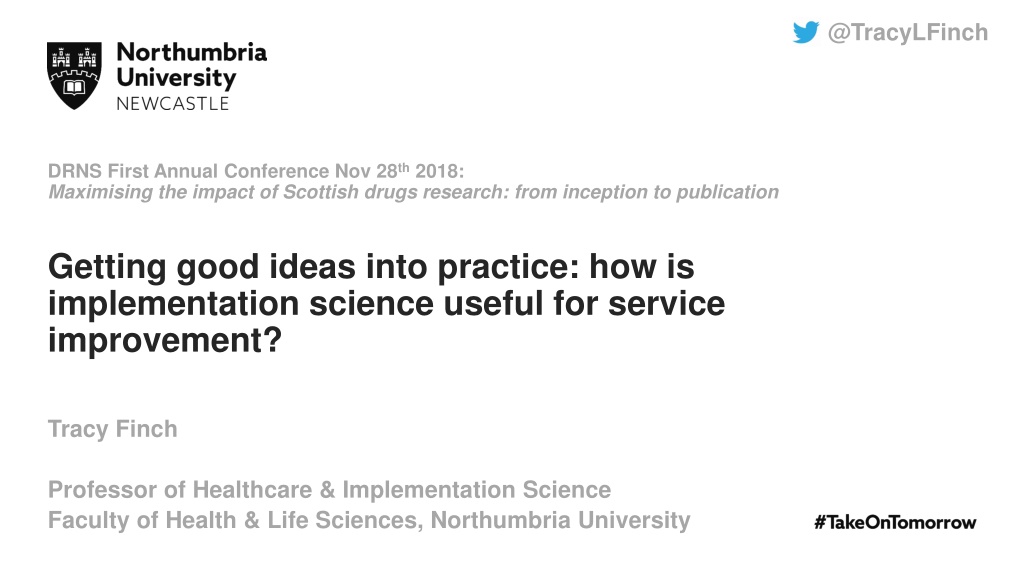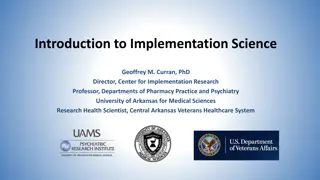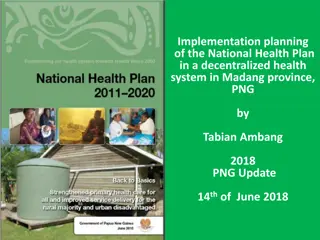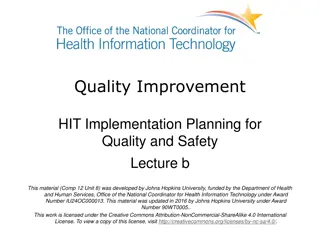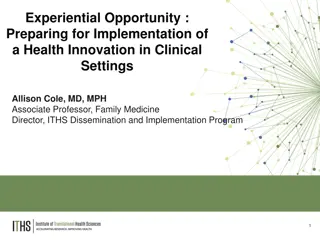Importance of Implementation Science in Health Research
Understanding implementation science is crucial for translating research findings into effective healthcare practices. It focuses on promoting the systematic adoption of proven interventions to improve health outcomes and healthcare systems. Implementation research examines methods to facilitate the uptake of clinical treatments and organizational interventions into routine practice, addressing challenges in implementing new therapies. Varied terminologies are used to describe the process, emphasizing the need to bridge the gap between research evidence and real-world application.
Download Presentation

Please find below an Image/Link to download the presentation.
The content on the website is provided AS IS for your information and personal use only. It may not be sold, licensed, or shared on other websites without obtaining consent from the author. Download presentation by click this link. If you encounter any issues during the download, it is possible that the publisher has removed the file from their server.
E N D
Presentation Transcript
@TracyLFinch DRNS First Annual Conference Nov 28th2018: Maximising the impact of Scottish drugs research: from inception to publication Getting good ideas into practice: how is implementation science useful for service improvement? Tracy Finch Professor of Healthcare & Implementation Science Faculty of Health & Life Sciences, Northumbria University
Why is (better) understanding implementation important? Getting evidence of new therapies/interventions into wider practice is necessary for achieving health outcomes and health system improvement but this is still problematic Clinical and applied health research can tell us if a new intervention is safe, beneficial, or more effective than a comparator but not whether it can be implemented in a routine practice setting When results of clinical studies (eg RCTs) are inconclusive are negative effects because of the treatment intervention being ineffective (not efficacious) or because it was too difficult to implement? Implementation science has seen the proliferation of theories, frameworks and tools to help with these problems, although not always easy to understand or to use for own purposes.
A definition of implementation research Implementation research is the scientific study of methods to promote the systematic uptake of proven clinical treatments, practices, organisational, and management interventions into routine practice, and hence to improve health. In this context, it includes the study of influences on patient, healthcare professional, and organisational behaviour in either healthcare or population settings. (Previously defined on BMC Implementation Science website Aims & Scope )
Implementation: One definition Implementation involves all activities that occur between making an adoption commitment and the time that an innovation either becomes part of the organizational routine, ceases to be new, or is abandoned ( ) [and the] behavior of organizational members over time evolves from avoidance or non-use, through unenthusiastic or compliant use, to skilled or consistent use. (Linton, 2002: 65) Linton, J.D. (2002) Implementation Research: State of the Art and Future Directions , Technovation 22(2): 65 79.
Varied terminology Implementation science Improvement Science Knowledge exchange Knowledge translation Knowledge transfer Knowledge integration Research utilization Colquhoun, H., Leeman, J., Michie, S., Lokker, C., Bragge, P., Hempel, S., . . . Grimshaw, J. (2014). Towards a common terminology: a simplified framework of interventions to promote and integrate evidence into health practices, systems, and policies. Implementation Science, 9(1), 51. Translational research
Nilsens taxonomy Nilsen, P. (2015). Making sense of implementation theories, models and frameworks. Implementation Science, 10(1), 53.
Varied approaches Atheoretical experience, instinct Process models guide planning and execution (e.g. Knowledge-to-action model, K2A framework) Determinant Frameworks understand and explain influences (e.g. Theoretical Domains Framework, CFIR) Implementation Theories - understand and explain influences (e.g. NPT, Implementation Climate) Evaluation Frameworks evaluate implementation (e.g. RE-AIM, PRECEDE-PROCEDE) Nilsen (2015) See: Nilsen, P. (2015). Making sense of implementation theories, models and frameworks. Implement Sci, 10.
Varied activity focus Planning and developing new interventions Maximise potential implementability Evaluating interventions Understand and best support implementation Roll out of proven interventions Increase scale and scope of dissemination See: Murray E, Treweek S, Pope C, MacFarlane A, Ballini L, Dowrick C, Finch T, Kennedy A, Mair F, O'Donnell C: Normalisation process theory: a framework for developing, evaluating and implementing complex interventions. BMC medicine 2010, 8(1):1.
Varied level of analysis Individual/ behavioural eg practitioners, patients, families . Provider/ service level eg, a particular GP practice, or team of providers Organisational level eg the health care system (eg the NHS), or larger organisation Structural level wider society, policy context, community health priorities * Theories and models differ in their emphasis on the different levels as well as practical purpose
What is NPT? A way of thinking about implementation problems that focuses on: How interventions can become part of everyday practice How different groups of people need to work together to achieve it How do I use it? Thinking of your intervention, use the four sets of questions on the right to identify possible barriers to successful implementation, and suggest solutions to improve the process. www.normalizationprocess.org
Or more simply. It s all about the work : What is it? (Coherence) Who does it? (Cognitive Participation) How does it get done? (Collective Action) Why did it happen like that? (Reflexive Monitoring)
By normalization, we mean the work that actors do as they engage with some ensemble of activities (that may include new or changed ways of thinking, acting, and organizing) and by which means it becomes routinely embedded in the matrices of already existing, socially patterned, knowledge and practices. May & Finch. Implementing, embedding, and integrating practices: an outline of normalization process theory. Sociology 2009, 43(3):535-554.
Waller, G., Finch, T., Giles, E. L., & Newbury-Birch, D. (2017). Exploring the factors affecting the implementation of tobacco and substance use interventions within a secondary school setting: a systematic review. Implementation Science, 12(1), 130.
Are Brief Alcohol Interventions Adequately Embedded in UK Primary Care? O Donnell, A., & Kaner, E. (2017). Are Brief Alcohol Interventions Adequately Embedded in UK Primary Care? A Qualitative Study Utilising Normalisation Process Theory. International Journal of Environmental Research and Public Health, 14(4), 350.
Embedding alcohol screening and brief interventions Theories used in combination and/or as complementary: NPT for insight into factors affecting organisational embedding of SBI Theoretical Domains Framework (TDF) for more change techniques focused on behaviour Frameworks used to anticipate likely barriers/facilitators and optimise approach to implementation & evaluation Concluded: Possible to reach a high number of patients in a busy hospital out-patient department and deliver ASBI by working with staff using theoretical frameworks for training. Combining theoretical frameworks allowed multi-level consideration
What does NPT tell us about implementing and sustaining change? Implementation work is complex and involves ongoing efforts to achieve sustainable change through building understanding of the work, establishing and maintaining the participation of key persons, and ensuring that participants/organisations have the means of appraising and adapting (where necessary) the work that has to be done.
Measures are moving towards pragmatism Glasgow & Riley (2013). Pragmatic measures: what they are and why we need them. American Journal of Preventive Medicine. Vol 45 (2) pp 237 243.
ImpleMentAll Implementation and scale up on internet-based mental health services 16 partners from 11 countries: Europe and Australia Evaluation of impact of ItFits toolkit for evidence-based guidance on tailoring implementation efforts to localised goals, barriers and solutions The emphasis is on tailoring to settings, to local problems, and staff groups involved http://www.implementall.eu/ This project has received funding from the European Union s Horizon 2020 research and innovation programme under grant agreement No 733025
26 It-Fits toolkit for iCBT implementation Taxonomy of strategies (Powell et al, 2015) Normalization (May et al, 2011) Implementation outcomes (Proctor et al, 2011) Design with TIDieR checklist (Hoffmann et al, 2014) Determinants eHealth (Vis et al, 2018) Prioritising with APEASE criteria (Michie et al, 2011) Module 4 Apply and review 1. initialise 2. verify & discuss 3. finalise Module 1 Identify Module 2 Match Module 3 Design 1. initialise 2. verify & discuss 3. finalise 1. initialise 2. verify & discuss 3. finalise 1. initialise 2. verify & discuss 3. finalise www.implementall.eu ImpleMentAll: European Union s Horizon 2020 research and innovation programme under grant agreement No 733025
How can we use theory to improve our (practical) problems of implementation? Plenty of theories and tools for use selection is key; can use multiple theories together, guidance is available Choices should be guided by: 1. What you are trying to achieve 2. The kind of change your are making and anticipated barriers and impacts that might be expected Theories shouldn t just be about understanding or evaluating used up front, can inform intervention delivery and strategies for implementing
Acknowledgements NPT Toolkit research and website development - ESRC RES-189-25-0003 NoMAD study ESRC RES-062-23-3274 ImpleMentAll - European Union s Horizon 2020 research and innovation programme under grant agreement No 733025 Colleagues too numerous to list Carl May, Tim Rapley, Frances Mair, Elizabeth Murray, Shaun Treweek, Melissa Girling, Sebastian Potthoff, Christiaan Vis & ImpleMentAll Consortium
